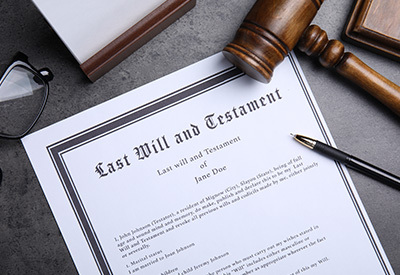Creating a last will and testament is a proactive step in detailing your wishes regarding the distribution of your assets and the care of any minor children after you pass away. However, while a will provides a framework for your intentions, it doesn't always guarantee that assets will be distributed exactly as specified.
Here are some reasons why:
- Probate process. Wills are subject to being validated during probate, a legal process where the court oversees the distribution of assets. This process can result in delays, and in some instances, assets might be used to pay off outstanding debts or claims before distribution to heirs.
- Contesting a will. Beneficiaries or potential heirs can challenge or contest a will if they believe they have been unjustly treated or if there's suspicion about the will's validity (for example, the testator was under undue influence, the will wasn't signed properly, etc.). If a will is successfully contested, the distribution of assets could differ from what was originally specified.
- Jointly owned assets and beneficiary designations. Assets that are jointly owned or those with designated beneficiaries (like life insurance policies and retirement accounts) typically pass outside of a will. This means they go directly to the co-owner or named beneficiary, regardless of what's written in the will.
- Legal restrictions. Some jurisdictions might have legal restrictions on disinheriting spouses or children. Even if your will stipulates otherwise, these laws might enforce a certain distribution.
- Outdated information. If a will isn't updated regularly, it might contain outdated information. For instance, if an heir predeceases the testator and there's no provision addressing such a situation, the distribution might be affected.
- Ambiguities in the will. Vague or ambiguous language in a will can lead to different interpretations, potentially affecting the intended asset distribution.
A person making a will, known as a testator, has the freedom to determine how their property and assets should be divided among their heirs or beneficiaries. Having a will helps individuals ensure that their legacy lives on according to their wishes. However, to make sure that a will is legally binding and is determined to be valid during the probate process, certain formalities must be followed during its creation and execution.
These formalities typically include signing the document in front of witnesses who are not beneficiaries named in the will. The witnesses' presence is intended to confirm that the testator was of sound mind and not under any undue influence or coercion when making decisions regarding asset distribution.
However, it is important to note that there are circumstances where a last will and testament may not necessarily be fully legally binding on asset distribution. For example, if someone successfully contests the validity of the will based on grounds such as lack of mental capacity at the time of its creation or if there were issues with its execution process, it could lead to disputes and potentially alter how assets are distributed.

Overall, while a properly executed last will and testament provides strong legal backing for asset distribution upon one's passing, it is crucial for individuals to ensure they adhere to all necessary legal requirements during its creation.
Reasons why a will might not be honored
While a last will and testament is generally considered a legally binding document that outlines how your assets should be distributed after your passing, there are certain circumstances when a will may not be honored.
As mentioned, the legal requirements for creating a valid will typically include elements such as the testator's mental capacity, proper signing and witnessing by competent individuals, and the absence of undue influence or duress. Failure to adhere to these formalities can lead to challenges against the validity of the will, potentially resulting in its rejection by the probate court.
Another factor that could affect the enforceability of a will is if it is outdated or contradictory. Over time, people's circumstances change – they acquire new assets, get married or divorced and have children or grandchildren.
In addition, disputes among family members or potential beneficiaries can also hinder the execution of a last will and testament. Emotions often run high during times of loss and grief, leading people to contest or challenge provisions outlined in a will.
These disputes can arise due to perceived unfairness in asset distribution, allegations of fraud or coercion surrounding the creation of the will, or even family conflicts that predate the testator's passing. In such instances, resolving these conflicts may require legal intervention that can delay and complicate the distribution process.
What happens if my will conflicts with beneficiary designations?

When creating an estate plan, it is essential to consider not only the provisions stated in your last will and testament but also the beneficiary designations you have made on specific accounts or policies.
Beneficiary designations, such as those for life insurance policies, retirement accounts or payable-on-death bank accounts, take precedence over the instructions outlined in your will. This means that if there is a conflict between your will and a beneficiary designation, the latter usually supersedes the former.
This distinction can have significant implications for asset distribution upon your passing. For instance, imagine you have designated a specific individual as the beneficiary of your life insurance policy or retirement account but later include different instructions in your will regarding who should receive those assets.
In this scenario, despite what is stated in your will, the designated beneficiary named on these accounts would typically be entitled to receive the proceeds directly. It is crucial to regularly review and update both your estate plan and beneficiary designations to ensure they align with your intentions.
Failure to do so could result in unintended consequences where assets go to individuals other than those specified in either document. Additionally, it's worth noting that certain jurisdictions may have laws that override beneficiary designations under specific circumstances or for certain types of assets. Consulting legal counsel well-versed in local regulations ensures that you understand any applicable rules governing asset distribution and can make informed decisions when crafting or updating both your last will and testament and beneficiary designations.
Whether drafting a new estate plan or revisiting an existing one, it is vital to pay close attention to how beneficiary designations interact with the instructions outlined in a last will and testament.
Can joint assets be distributed through a will?
When contemplating the distribution of assets through a last will and testament, one aspect that often arises is the question of joint assets. Joint assets are those owned by two or more individuals, typically with rights of survivorship.
Many people wonder if they can be distributed through a will, given that joint ownership often includes automatic transfer to the surviving owner. The answer to this question depends on the type of joint ownership and the specific provisions outlined in the last will and testament.
One type of joint ownership is joint tenancy with right of survivorship (JTWROS), which is commonly used for real estate or investments. In this scenario, when one owner passes away, their interest automatically transfers to surviving owners outside of probate court. However, your will should address distribution of the property if you are the last surviving owner.
Consequently, assets held under JTWROS generally cannot be distributed through a will as they are not considered part of the deceased owner's individual estate. Instead, upon the death of an owner in a JTWROS arrangement, the surviving owners assume complete ownership without any involvement from probate.
It's important to note that not all types of joint ownership function in the same way as JTWROS. For instance, tenants in common (TIC) – another form of joint ownership – allows multiple individuals to hold unequal shares in an asset while still maintaining rights to transfer or sell those shares independently during their lifetime or via inheritance upon death.
In cases where property is held under TIC arrangements, an individual's share can be distributed through their last will and testament. This allows them to specify the beneficiary or beneficiaries who should receive their portion upon their passing, overriding any automatic transfer provisions.
Do all assets have to go through probate?

The process of distributing assets after someone passes away often involves the legal procedure known as probate. However, not all assets are required to go through this process.
Understanding which assets are subject to probate and which ones are not can greatly influence your estate planning decisions and ensure a smooth transition of your legacy to your beneficiaries. For starters, it’s important to note that probate laws can vary depending on the jurisdiction.
Generally, assets that must go through probate are those solely owned by the deceased individual without any designated beneficiary or co-owner. These assets typically include real estate properties solely registered in the decedent's name, bank accounts without payable-on-death (POD) designations and personal belongings with significant monetary value.
On the other hand, there are certain types of assets that bypass probate altogether, such as assets funded into a revocable trust or irrevocable trust. Similarly, life insurance policies with named beneficiaries will be paid directly to those individuals upon the insured's death. Also, retirement accounts such as 401(k)s or IRAs with designated beneficiaries will pass outside of probate and be transferred directly to them. Furthermore, jointly owned property can also avoid probate.
When two or more individuals co-own property with rights of survivorship or hold joint tenancy with right of survivorship (JTWROS), their shares automatically transfer to the surviving owners upon one owner's death. While many people strive to minimize the portion of their estate going through probate due to associated costs and delays, it is worth noting that some states offer simplified procedures for smaller estates that may not require full-blown probate proceedings.
Understanding whether an asset needs to go through probate is crucial for effective estate planning. By identifying which assets fall within this category and taking appropriate steps such as naming beneficiaries or establishing joint ownerships where possible, individuals can streamline the distribution process while ensuring their final wishes are carried out smoothly and efficiently.
Conclusion
While a last will and testament is an essential component of estate planning, it does not guarantee how your assets will be distributed.
The legal system allows for various circumstances that may invalidate or challenge a will. It is crucial to understand the limitations and potential risks associated with relying solely on a will to distribute your assets.
To ensure that your wishes are honored and your legacy protected, it is recommended to have a comprehensive estate plan in place. This can include strategies such as establishing trusts, designating beneficiaries for retirement accounts and life insurance policies, and considering joint ownership of certain assets.
By diversifying the distribution methods beyond just a will, you can provide additional layers of protection against potential legal disputes. Remember that proper execution of your estate plan is vital.
Seek professional advice from an experienced attorney or estate planner who can guide you through the intricacies of creating a comprehensive plan tailored to your specific needs and goals. Regularly reviewing and updating your plan as circumstances change is also crucial to ensure that it remains current and aligned with your wishes.
Ultimately, by taking proactive steps toward safeguarding the distribution of your assets through careful planning, you can provide peace of mind not only for yourself but also for your loved ones. Your legacy and inheritance should reflect the values you hold dear, so investing time and effort into thorough estate planning ensures that those closest to you benefit from the fruits of your labor in accordance with your intentions.



